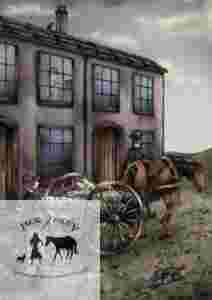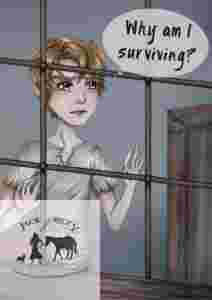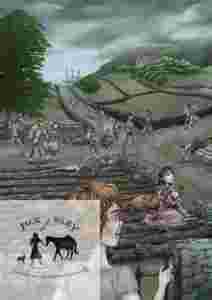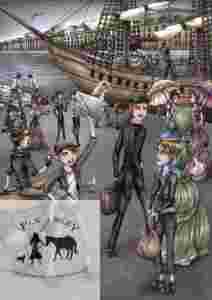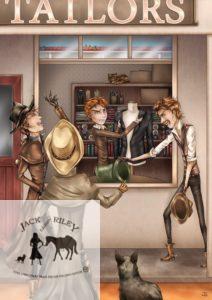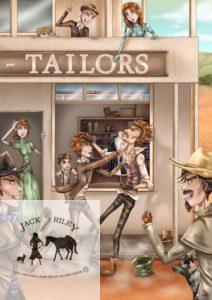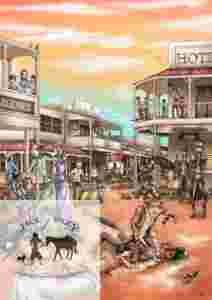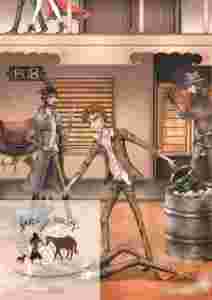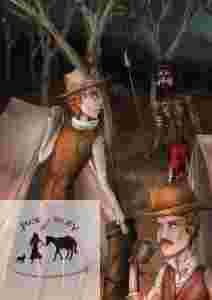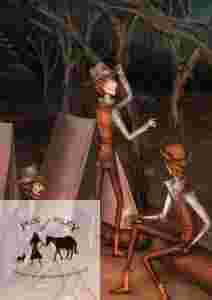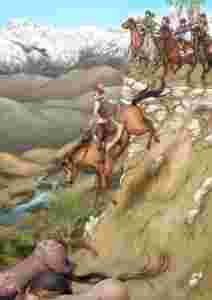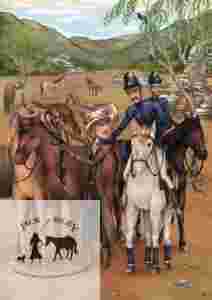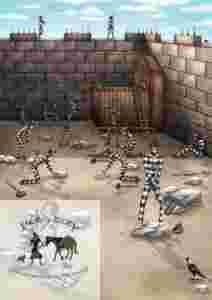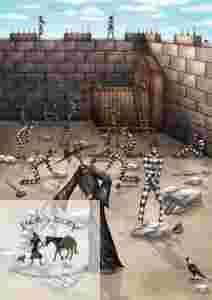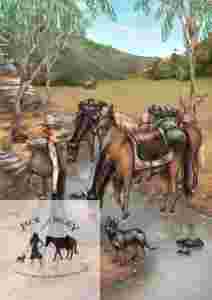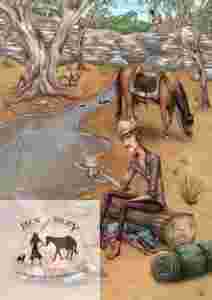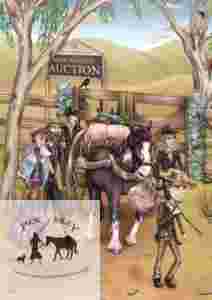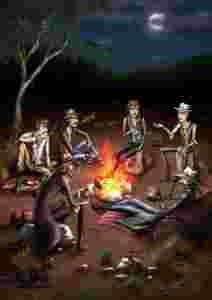The  Times
Times
13 March 1890
Births.
CANTOR.-On March 8, at her residence, No. 3, Carlton Terrace, Melbourne, the wife of Mr Hyam Cantor of a son.
COLEMAN.-February 27, at her residence, Kensington Street, the wife of John Coleman, of a daughter. Both are doing well.
Marriages.
ELLIOTT-RICHARDS.- April 4, 1877, at St. Thomas’ Church, Enfield, by the Rev. G. King, Seward Elliott, of Paddington, to Sarah Richards, eldest daughter of Jabez Richards, of Cowbridge, Glamorganshire, South Wales.
LAWRY-PERRY.-24 February, at the residence of the bride’s parents, Linton, North Shore, by the Rev. T. S. Forsaith, assisted by the Rev. B. Chapman, Walter Forsaith Lawry, eldest son of Rev. H. H. Lawry, of Auckland, N. Z., to Marguerite Elizabeth Simpson, second daughter of J. S. Perry, Esq., of Sydney.
Deaths.
BRIDGE.—March 5, Mr George Bridge, late of Aberdour, Wollombi, after a short and painful illness, aged 62 years. “He sleeps the sleep of the righteous.”
EDSON.—March 12, at No. 13, Nobbs Street, off Bourke Street, Surry Hills, Colin Clive Morten, infant son of Morten and Julia Edson, aged 18 months.
FLEMMING.-10 March, at Darlington, William Hubert, son of Edward G. Flemming, aged two years and three months.
FULLER.-22 February, at his parents’ residence, Merton Street,
Petersham, Percy, beloved infant son of Benjamin and Fanny D. Fuller, aged seven days.
EUROPEAN TELEGRAMS.
[BY SUBMARINE CABLE.]
(REUTER’S TELEGRAMS.)
THE BUDGET.
LONDON, MARCH 11.
The Chancellor of the Exchequer made his annual budget speech in the house of commons this evening.
Therevenueforthe past financial year,1879-80, amounted to £80,860,000, being £2,250,000 below the income of the year
1878 9, which was £83,110,000.
The expenditure for the year 1879-80, on the other hand, was £84,210,000, showing a diminution on that of the previous year of £1,150,200, the amount for 1878-79 having been £85,375,000.
The Chancellor of the exchequer estimates the revenue for the year 1880 was £81,500, being £1,440,000 below the sum he estimated last year as the revenue for the years just ended; he estimates the expenditure for the same period at £81,485,000, being £360,000 above the amount which he estimated would be the expenditure of 1879-80, viz, £81,125,000.
Sir Stafford Northcote announced that it was intended to covert the £6,000,000of Exchequer bills issued in 1878 for the great credit granted by the House into terminable annuities. He further stated that no increase of taxation would be proposed at the present time.
LABOUR AGITATION IN CALIFORNIA.
SAN FRANCISCO, MARCH 11.
The speeches of Mr Kearney, the leader of the working man’s party in San Francisco has lately been causing some concern to the city’s authorities, as calculated to bring about disturbances by their exciting and inflammatory character.
In a speech just delivered, he went to such lengths that the police arrested him for uttering seditious language.
MARCH 11, Night.
Kearney has been released from prison on bail.
THE LABOUR TROUBLES IN
ENGLAND.
(BY CABLE FROM OUR CORRESPONDENT.)
STRIKE OF DOOK LABOURERS AT LIVERPOOL.
LONDON, February 27.
Two thousand dock labourers at Liverpool have gone on strike to support the demand of the grain trimmers for increased wages
DEMAND OF NOTTINGHAMSHIRE COAL MINERS.
LONDON, February 27.
Thirteen thousand coal miners in Nottinghamshire have demanded an advance of 10 per cent in their wages and threaten to go on strike if their demand is not conceded
JACK RILEY WINE COOLER BAG
The Jack Riley Edition insulated wine cooler bag celebrates the original Man from Snowy River. Carry two bottles of wine, beer or spirits to a BBQ, dinner, or any special occasion. Order yours now from JackRiley.com. Be the envy of your friends with your waxed cotton wine bottle holder. It also makes a great wine gift pack.
Be quick. Order Yours now from
MARINE OFFICERS-ASSOCIATION.
The Mercantile Marine Officers’ Association in New Zealand has been registered under the Trades Unions Act and now include all captains and officers sailing in New Zealand waters. The association has been brought into existence, says its articles, to counteract influences that are working against its members’ interests, to initiate reforms, to sweep away abuses, to enable its members to fill their social position with comfort to themselves, maintain the dignity of their position, and to watch over and guard the interests of its members wherever they may be assailed; and while doing this, members are requested to bear in mind that the association is not formed to work in antagonism to their employers.
On the contrary, they are earnestly requested to show by their ability and general fitness for the positions’ that their being members of the association is a guarantee to owners or companies that in employing them, they are consulting their own interests.
ANOTHER LIBEL ON THE WORKERS.
We noticed in the daily press last week, a message from the old land to the effect, that Bishop Barry,
late of the colonies, in discussing the socialist programme at great length in London, expressed his opinion that the high wages current in Australia have retarded the development of the country. We do not only say that the assertion of the Bishop’s is false, but it is, as we say, above a libel on the workers of these lands. We cannot understand how the Bishop could be led so far astray unless he wilfully decided to expound that we are satisfied he knows to be a bare-faced fabrication.Why, in London at the present time, we know the greatest authorities are at, their wits ends, as it were, to solve the problems; how to prevent wages from falling below a fair amount; how to make employment easily findable at all times and all seasons; how to cure and to avoid pauperism, etc.; and besides this, such authorities admit insufficient wages cause the present state of the working classes throughout England
We cannot at all understand how the Bishop could ever be so inconsistent in his contentions; had he carried his swag through this colony and earned his tucker amongst our farmers, he would, we feel sure, have been the last one to talk such claptrap. We like honesty, even in a Bishop; hence, we are sorry to notice such false and misleading assertions coming from those from whom we might have expected different things. We admit that a few of our artisans get good pay for their works, but in comparison, their employers gain.
Did our workers work for half the wages they at present get, we would like to know how the development of the country would be more advanced? The few are the winners now in Australia, and should the many that is the toilers be satisfied with less reward for their labour; we fancy those few would only be the winners to a greater degree. We do object to such as Bishop Barry or any other person of such a class, casting such a libel on the wealth producers of our land.
GEELONG.
(FROM OUR OWN CORRESPONDENT)
FRIDAY EVENING
A girl named Sarah Saunders, aged 14 years, daughter of a tinsmith residing in Ashby, narrowly escaped a violent death near Lara this evening.
She was returning in a special tram from Melbourne with a number of state school scholars, who had gone to the metropolis to visit the Exhibition.
Whilst the train was passing the Lara station at a reasonably rapid rate, a boy in the same carriage as herself threw her hat out of the window of the carriage, which was one of the American kind. The girl rushed out of the open door, leapt after her hat, fell lengthways on the side of the railway line, and escaped without the slightest injury.
THE PROBLEMS OF GREATER
BRITAIN.
SIR CHARLES DILKE ON AUSTRALIA.
We reviewed Sir Charles Dilke’s important and exciting work on the British possessions abroad in our issue of Wednesday, March 5. Today we give some extracts from the volumes: –
THE PUBLIC MEN OF VICTORIA
SIR HENRY PARKES
“Sir Henry Parkes, who has something of the aspect of Mr Punch’s Father Thames, but with a clean beard, is the patriarch among colonial politicians. His enemies have described his career as a closely-knit tissue of successful artifice, and it is characteristic of the man that, a number of copies of the publication in which that statement was made having been purchased by a previous Administration, on coming into office he caused them to be burnt at a bonfire at the Government printing office Sir Henry Parkes is not only one of the oldest Parliamentarians in Australia, but one of its most experienced administrators and beat political -tacticians ‘the average ability of the leading politicians is not so high, I think, in New South Wales as in Victoria, but Sir Henry Parkes in New South Wales stands head and shoulders above his rivals.
In England, he had been a mechanic, but he began colonial life as a toy shopkeeper and poet, and after a stormy career, he is, with intervals, the supreme ruler of the colony, He is now by far its ablest speaker, and in his best efforts displays a rough eloquence which puts him on a level with the more cultivated Mr Higinbotham of Victoria, with Bishop Moorhouse of Manchester, who has left an excellent reputation in the colonies, and with Mr Dalley, now no more. It is not often that Sir Henry Parkes reaches those heights, but he is at all times a powerful and suggestive speaker.
He is not really popular, but only followed or admired, which is a different thing, and, while he has few old friends, he has many foes. He is capable of significant ideas and is often the author of far-reaching proposals but wants to grasp detail. He is in his element m a popular assembly, reigning and rejoicing in the storms of debate with marvellous physical power. He tends to be jealous of his neighbours, and, in a colony that, as a whole, is jealous of Victoria, he is the most jealous person.
When in the Chinese matter, the Victorian Government, fearing a popular tumult, took strong measures to prevent the landing of Chinese immigrants, Sir Henry Parkes, who was unable through popular pressure to take the opposite course, outbid the Victorian Government in the same line, pressed forward a violent bill, and publicly declared his indifference with regard to the feelings of the Governor or the guns of the British warships in the harbour
Sir Henry Parkes has retired from public life more often than a popular actor from the stage, and the occasional rallies of his effects have not lessened the number of his political admirers. Sir Henry Parkes believes in himself His years protect him from the assaults of the young lions, and when he closes his speeches by reference to the whiteness of beard and hair which has come upon him in the service of his adopted country, the people are apt to go and vote for the ‘ poor old man ‘. When Sir Henry Parkes wrote in ‘The Strong Man’-Like a rook that breasts the sea.
Firm, he stood, in front of foes;
To his friends, a sheltering tree
That in changeless beauty grows; he may have been thinking of himself, but in person, he has been as little favoured by nature with good looks as Socrates or Darwin.
For all that, there is an assurance of strength in the massy features and a consciousness in the eyes that their owner is not an ordinary man. The fact is that, with all his faults and all his weaknesses, Sir Henry Parkes is the only significant political power in New South Wales.
His sympathy with the democratic ideas which are uppermost in Australia and his devotion to the colony and broad grasp of affairs give him a greater hold upon the people than any other Australian public roan.
His debts, his poetry are powerless to sink him, and as a man who knows how to use, like so ninny chessmen, the sections which take the place of parties in colonial politics, he is undoubtedly one of the ablest of colonial politicians, in this respect almost ranking with Sir John Macdonald.
THE ELECTRIC LIGHTING OF LONDON
(From ” The Queen,” October 12, 1889.)
While Mr Edison has sailed from Havre with fresh plans for the lighting up of the new world at night by electricity from the Atlantic waves, and Sir Edward Watkin is busy with experiments which can scarcely fail to lead to electric traction on the Metropolitan Railway, the progress in the electric lighting of London houses is making such steady headway that, although later in the beginning than many other cities, she promises before long to outdistance them all. The practical Briton naturally first looked for assurance as to the cost.
The saving in damage done to furniture, books, pictures, and artistic decorations, and the labour of cleaning, has been admitted for some time past; people then began to realize that Fire Insurance would be reduced from 42s to 25s per £100 even in theatrical ventures, and latterly the establishment of “central stations” has recently given a startling impetus to the adoption of this delightful light, which now really threatens to supersede the obnoxious gas, which not only consumes air vital to health but proves so destructive to all we most value in our houses.
“Wiring a message” is a term familiar to most people, and “wiring the premises” promises soon to become a household word. Instead of the gas being “laid on,” the progressive London householder will arrange for an “installation.”
The electric light has passed the experimental stage and may be regarded as an everyday necessity. Prices have hitherto prevented it from becoming popular; but its advantages have been fully admitted for some time, and now that central stations are supplying “current” at a price almost equivalent to that of gas, there is every reason to believe that in a few months the increase in electric lighting will be very marked.

